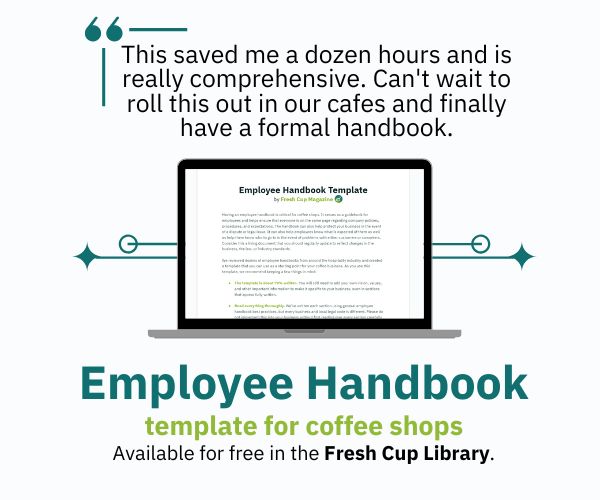Workers at over 100 Starbucks locations walk out as a new CEO takes over. Plus, research from Brazil examines the link between coffee certifications and environmental law, and Blue Bottle quietly shelves its zero waste plans.
‘Starbucks Workers Protest Before Annual Shareholder Meeting’ – via ABC News
On the day before Starbucks’ annual shareholder meeting, workers from over 100 stores walked out and held rallies to protest the company’s response to unionization. Union organizers have asked shareholders to vote in favor of a third-party assessment of the company’s labor relations.
Protests took place all across the United States, including outside Starbucks’ Seattle headquarters. Interim CEO Howard Schultz recently announced he was stepping down from his leadership role in the company—Schultz was set to hand over the CEO title to Laxman Narasimhan on April 1st but decided to step down two weeks earlier than anticipated and in advance of his appearance in front of the Senate Committee on Health, Education, Labor & Pensions. After initially declining to testify, the committee prepared to subpoena Schultz to question him about Starbucks’ alleged anti-union actions, but the company switched course and announced Schultz would testify.
Starbucks Workers United said the demonstrations were held to urge Narasimhan, as the new CEO, to take a more conciliatory approach to organizing. “Starbucks baristas like me are the ones who keep our stores running. We remember our customers’ regular orders, make the lattes, clean up spills, and are often the bright spot of our customers’ days,” said Sarah Pappin, a Seattle Starbucks worker. “Starbucks should respect our right to organize and meet us at the bargaining table.”
The company disputed the number of walkouts “and said nearly every store remained open,” according to ABC News. Social media posts shared by the union showed walkouts in multiple states, from Georgia to New York and Tennessee to Minnesota. Veteran organizer Richard Bensinger shared a video of strikers talking with motorists, commenting, “in almost 50 years of organizing I have not seen this degree of customer support. Car after car turning around.”
‘Brazil Study: Environmental Law and Coffee Certifications Are Related’ – via Daily Coffee News
A new study from Brazil looked at the effects of agricultural certifications such as Rainforest Alliance on deforestation and natural regeneration rates in one of the largest coffee-producing areas in the world.
Researchers examined 531 coffee farms in the Atlantic Rainforest and Cerrado biomes in Southern Brazil. The study, published in Biological Conservation, found that while certifications don’t necessarily reduce deforestation or increase plant cover, they can act as an additional incentive to comply with environmental legislation. The study also found that in the Atlantic Rainforest area, certified farms restored more sensitive areas, such as riverbanks and mountaintops, than non-certified farms.
“In Brazil, certification can be a worthwhile tool to strengthen compliance with the Native Vegetation Protection Act, also known as the Forest Code, given the lack of interest among landowners and weak enforcement by the government,” said lead author Francisco d’Albertas Gomes de Carvalho.
Originally passed in 1965, the Forest Code mandates that private landowners in ecologically sensitive areas protect most of their land from development. The law was controversial then, and subsequent revisions have included major loopholes permitting deforestation.
“We didn’t observe a direct cause-and-effect relationship between certification and deforestation or natural regeneration, but certification can apparently serve as an additional incentive to comply with the legislation, confirming that the synergy has beneficial effects,” d’Albertas continued.
The researchers also found that non-certified farms, particularly those in the Atlantic Rainforest region, were more likely to meet Rainforest Alliance benchmarks due to stricter local legislation and a more mountainous terrain which makes mechanization less viable. These farms, the authors note, are prime candidates for certification because price premiums can incentivize more protections and restoration.
More News
‘Starbucks Braced for Price War in China as Rivals Pile into Coffee Market’ – via Financial Times
‘MICE2023 to Host Richest Barista Competition With $40k Cash Prize Pool’ – via BeanScene
‘Starbucks’ Olive Oil-Infused Coffee Drinks are Making Their US Debut Despite Some Skepticism’ via Business Insider
‘Celebrity Gamer Jacksepticeye Relaunches’ Snobbery-Free’ Coffee Line’ – via Daily Coffee News
‘Dungeons & Dragons Is Getting The Coffee Club Treatment’ – via Mashed
‘Japan’s Typica Coffee Is Coming To New York City’ – via Sprudge
‘Grind Acquires Bottleshot Coffee to Drive RTD Retail Channel Growth’ – via Global Coffee Report
‘Cairngorm Coffee Roasters Reports Changes in UK Millennial’s Coffee Habits’ – via Global Coffee Report
‘Coffee-Hooked Libyans Brace for Low-Caffeine Ramadan Days’ – via France 24
The Week in Coffee Unionizing
- While the company’s shareholder meeting was in progress, Starbucks Workers United announced that seven stores from Kentucky to Washington had filed to unionize. “With this new wave of organizing, we invite incoming CEO [Laxman Narasimhan] to chart a new path forward with our union and give us the respect and dignity we deserve as fellow partners,” the group wrote on Twitter.
- House Republicans issued a subpoena to the National Labor Relations Board for failing to conduct fair and impartial union elections at Starbucks and mishandling elections in favor of unionizing employees. The House Committee on Education and the Workforce alleges that NLRB officials “engaged in substantial misconduct” in at least one election at a Kansas location. An NLRB spokesperson said that an agency review showed that ballots were mishandled in one election and should be redone while also pointing out that previous cases found that Starbucks broke federal law hundreds of times, and investigations were still ongoing in additional cases.
- After reaching a tentative agreement last week, unionized workers at Heine Brothers’ Coffee in Kentucky have ratified their first contract. The contract was approved by more than 99% of the 230 workers represented by the union and came just months after Chicago Intelligentsia workers ratified theirs in December 2022.
The Week in Corporate Coffeewashing
In December 2019, Blue Bottle Coffee announced that by the end of 2020, all its US cafes would be zero waste, “celebrat[ing] reuse as an act of aesthetic delight.” Among other actions, the chain planned to eliminate single-use cups and begin selling coffee in bulk rather than in bags. The move received a lot of press and was referenced several times over the years, although the target date to implement these new measures kept shifting.
Then-CEO Bryan Meehan wrote in a blog post that one of the motivations for the move was to influence Nestlé, which bought the specialty coffee trailblazer in 2017, to become more sustainable. “Our role at Blue Bottle is to inspire Nestlé to do more,” Meehan wrote.
But four years later, according to a piece in the San Francisco Chronicle, “Blue Bottle outlets continue to hand out single-use cups for patrons to sip on the company’s chicory-infused New Orleans iced coffee and other beverages on-site.” Few customers, the paper notes, bring their own travel mug, and coffee is still sold in individual bags.
The company said the zero waste plan “was put on pause due to temporary cafe closures and concerns around the COVID-19 pandemic.” Instead, Blue Bottle has shifted towards highlighting “a food waste reduction program and new standards like post-consumer recycled content thresholds in paper products.”
At the time of the announcement, the company estimated that it used 12 million single-use cups per year across its nearly 70 US cafes—it now has more than 100 worldwide.
Although it plans to continue with its “zero waste diversion plan,” a Blue Bottle representative said the company’s goal of eliminating single-use cups has been “shelved.”
Is Coffee Good For You?
A study found that coffee has “striking effects” on physical activity, causing drinkers to take on average 1,000 extra steps per day—but lose about 36 minutes of sleep per night.
The research, published in the New England Journal of Medicine, also looked at coffee’s impact on heart palpitations and found mixed results: coffee did not cause a common palpitation type called premature atrial contractions but could lead to an increase in a different kind of palpitation called premature ventricular contractions. The former has previously been considered a side effect of coffee drinking, while the latter is relatively common and benign for healthy people.
“The reality is that coffee is not all good or all bad—it has different effects,” said Gregory M. Marcus, an author of the study, in a statement neatly answering the central question of this section of the roundup. “In general, this study suggests that coffee consumption is almost certainly generally safe. But people should recognize that there are these real and measurable physiological effects that could—depending on the individual and their goals of care—be harmful or helpful.”
Beyond the Headlines
‘Column: Preventing Labor Abuses Requires Supporting Farmers’ by Quinn Kepes and Miguel Zamora
‘The Cup In Hand: How Shape and Design Affect Coffee Drinking’ by Mikey Rinaldo















